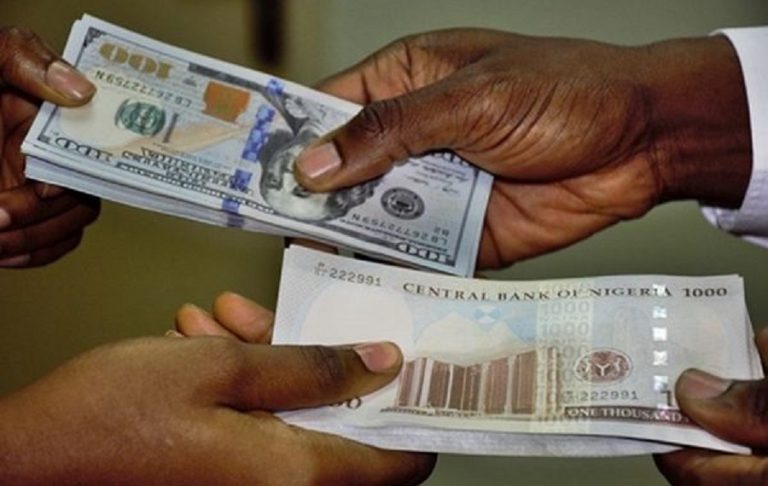
Despite the Central Bank of Nigeria’s (CBN) spending over $130 billion to defend the naira and a slew of policies aimed at bolstering its value over the last six years, the Nigerian currency has depreciated by over 209.2%, falling from N196.99 to a dollar in December 2015 to N412.06 to a dollar in September 2021.
The parallel market has seen considerably more depreciation, with one dollar selling for about N550 in September 2021, compared to around N230 in December 2015.
According to the findings of the Nigerian Tribune, the apex bank sold as much as $130.6 billion to foreign exchange market operators in its numerous interventions between 2016 and the first quarter of this year, even as it devised dozens of measures to save the sagging national currency.
According to papers and information available on the CBN website, the CBN defended the naira with $11.7 billion between January and December 2016. In 2017, the sum was $15.8 billion, then $36.6 billion in 2018, $34.3 billion in 2019, and $27.84 billion in 2020.
Read also: Maduka: I’ll establish a seaport in Onitsha and create a business-friendly atmosphere
The CBN spent $4.37 billion in the first quarter of 2021 to defend the naira. The records revealed that the CBN continued to intervene directly in the interbank foreign currency market to maintain exchange rate stability in order to relieve pressure on the naira.
As a result, it sold dollars on the foreign currency market, which included interbank spot, Invisibles, SMEs, the I&E window, and forwards sales at various times. Although using dollars to defend the naira has reduced pressure on the currency, it has also eroded the country’s foreign reserves, which remained at $33.32 billion as of June 30, 2021, less than a fourth of what was used to save the naira.
Emefiele explained the rationale for using the country’s external reserves to protect the naira, saying the CBN Act requires the central bank to defend the currency, and that a flexible exchange rate would not benefit the poor. I am dedicated to safeguarding the Naira. The Naira cannot be allowed to float freely.”
Mr. Godwin Emefiele’s tenure as governor of the Central Bank of Nigeria has seen the implementation of a number of initiatives aimed at bolstering the naira’s value. The selling of dollars to people involved in the importation of 41 commodities that might be produced in Nigeria was halted in June 2015.
The decision was made to “conserve foreign reserves as well as enable the revival of local industry and improve employment generation,” according to the national bank. During a news conference in January 2016, the CBN governor announced that the apex bank will no longer sell dollars to BDCs.
“From now on, the Bank will no longer sell foreign exchange to BDCs,” he stated. Operators in this market category will now have to obtain their foreign exchange from unaffiliated sources. They should be aware, however, that the CBN would devote greater resources to monitoring these sources in order to guarantee that no operators are breaking our anti-money laundering laws.”
Emefiele went on to say that the actions were not meant to be punitive, but rather to ensure the nation’s resources were preserved and the financial system was stabilized. However, the CBN then overturned its decision and resumed selling dollars to BDC firms.
The CBN opened a fresh window for investors, exporters, and end-users in 2017, with the goal of raising liquidity and driving the currency rate lower. However, since the naira continued to fall, this was ineffective. The CBN expanded the list of commodities prohibited from obtaining foreign exchange to 42 in 2018 when it imposed a foreign exchange ban on the importing of fertilizers.
This was revealed in a circular headed “Re: Inclusion of some imported products and services on the list of items designated as “Not Valid for Foreign Exchange in the Nigerian Foreign Exchange Market.”
“In the continued effort to sustain the achievement recorded from the classification of 41 items as ‘Not valid for foreign exchange in the Nigerian foreign exchange market, authorized dealers and the general public are hereby notified of the inclusion of fertilizer on the lists effective Friday, December 7, 2018.” said the circular signed by Ahmed Umar, Director, Trade and Exchange Department.
The CBN devalued the naira in March 2020, adjusting the official exchange rate from N307 to N360 per dollar.
The governor of the Central Bank of Nigeria (CBN) ordered businesses and people to stop using the parallel market for foreign currency conversion in May 2020.
Later that month, the apex bank lifted the FX restrictions on maize imports, citing the need to “boost local production, stimulate a speedy economic recovery, safeguard rural livelihoods, and increase jobs that were lost as a result of the ongoing COVID-19 pandemic.”
The CBN introduced the Naira for Dollar policy for Diaspora remittances in March 2021. Recipients of Diaspora remittances will be given N5 for every $1 received in remittance inflow under the scheme.
In July 2021, the CBN declared that all currency sales to Bureau De Change operators will be halted due to unlawful forex trading and economic sabotage. New BDCs will not be registered, according to the CBN.